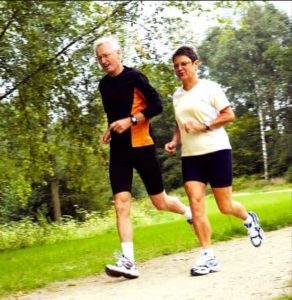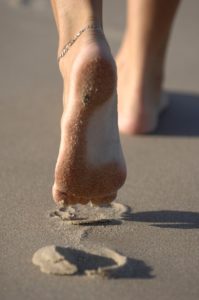As anyone who has ever lost a lot of weight (like 20 pounds or more) will tell you, the first 5 come off easily and the last 5 are the toughest! You’re still doing all the right things—eating less and moving more—but all of a sudden it stops working. The scale won’t budge. No matter where you are in the process, hitting a stubborn weight loss plateau is frustrating. But don’t let it erode your resolve. Here are 3 ways to break through the plateau.
This article is also available as a podcast. Click below to listen:
Tip#1: Calorie Cycling
In order to lose weight, you need to cut back on your calorie intake. But if you that for long enough, your body may play a nasty trick on you: It may start conserving energy by lowering your metabolic rate. The result? You don’t burn as many calories and your weight loss slows—or stops altogether. Although this feels like the worst kind of sabotage, your body is actually trying to look out for you. Your lizard brain has noticed that food supplies seem to have been scarce for an extended period of time. It’s trying to increase your chances of survival in case the famine continues. Of course, when you’re trying to lose weight, this is not very helpful.
See also: Metabolism Myths
You’re really stuck between a rock and a hard place: You could try eating even less in order to nudge off more weight, but that just confirms your lizard brain’s suspicions about the dwindling food supply. Or, you could eat more in an effort to restore a more robust metabolic rate—but that’s hardly going to help with weight loss. There’s a way to outsmart old lizard brain: It’s called calorie cycling.
What is Calorie Cycling?
Let’s say you’ve been eating about 1800 calories a day and steadily losing weight. Now suddenly, it’s not working anymore. Rather than trying to eat even less every day, try alternating high and low calorie days. For example, you could alternate between 2000-calorie days and 1200-calorie days. Over the course of a week, you’d trim an extra 1400 calories but the higher calorie days should help keep your lizard brain from panicking–and your willpower from flagging.
What are the Advantages of Calorie Cycling?
First of all, the higher calorie days keep your metabolism from slowing in response to sustained calorie restriction. Secondly, many people find that this sort of regimen feels easier than constant restriction. Although you may feel hungry on your low-intake day, you’ll always have a higher intake day to look forward to.
In fact, you could even try alternating higher and lower intake days without reducing the total number of calories for the week —alternating 2000-calorie days with 1600-calorie days, for example. Even without a net reduction in calories, the switch-up might be enough to knock you out of a metabolic slow-down.
Calorie Cycling is Not for Everyone
Calorie cycling clearly isn’t for everyone, and I’d encourage anyone considering it to check in with their doctor or nutrition professional first. Those with diabetes, hypoglycemia, who are pregnant, or have a history or risk of eating disorders are not good candidates for this technique.
Aside from health issues, some people may simply prefer a more traditional approach. And, honestly, as long as what you’re doing continues to work, I’d stick with that. But should you hit a plateau, calorie cycling might be something to try.
Tip #2: Mix Up Your Workouts
Although you can lose weight without exercising, exercise can help those pounds come off more quickly. However, when it comes to exercise, that darned lizard brain thwarts us once again. If you do the same workout routine over and over again, your muscles will learn to perform those motions using less energy–and you’ll burn fewer calories. (And, by the way, the “calories burned” displays on gym cardio equipment are notoriously inaccurate!)
To maximize the benefit from your exercise sessions, you want to mix it up. Try some new classes, a different cardio machine, or even a different program on your favorite cardio equipment. (Best program for fat-burning? Interval training!) If you prefer low-tech exercise, like walking or jogging, try to find a new route that involves some extra hills, or work some 60-second sprints into your routine.
Tip 3#: Slow Down
My final tip isn’t so much about changing the speed at which you’re losing weight as it is about reframing how you look at it. The closer you get to your goal weight, the slower the weight tends to come off. If you’re thinking of your goal weight as a finish line, this is supremely frustrating. Then again, if you lose those last pounds quickly, chances are good that they’ll come right back the minute you relax your efforts.
Rather than trying to sprint across the finish line, think of the last 5 pounds as your cool down. By losing the last of the weight more slowly, you’re actually making a gradual transition—both mentally and physically—into your long-term maintenance phase. If it takes you 6 months to lose the final pounds, that’s 6 more months of healthy eating habits under your belt. And that greatly increases your chances of maintaining a healthy weight for the long term.
See also: The case for slower weight loss
Originally published at QuickandDirtyTips.com




